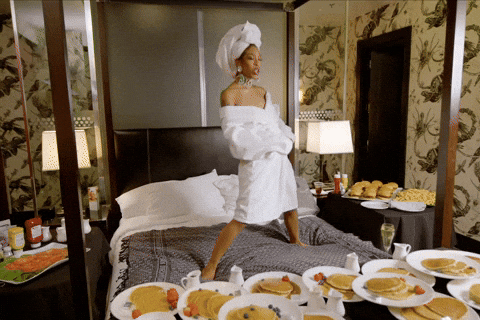
Not too long ago, while in an interview, someone asked me for a top complaint that I hear husbands say (first) and then wives state (second) as it relates to what goes down (or doesn’t go down) in the bedroom.
Ladies first: when it comes to women, I think what comes up more than anything might surprise some: it’s boredom. A lot of wives want there to be more spontaneity instead of taking the “If it ain’t broke, don’t fix it” approach from their partner. As for men? I mean, would anyone be shocked to hear that they wished their wife would initiate sex more often?
I’m telling you, over frequency, technique, and even dressing up more for bed (and yes, those things also come up quite a bit), hands down, what I hear that more men want is for their partner to show them that they are desired by taking the initial steps to make copulation happen…more often.
And so, since I’m all about doing whatever I can to reduce dissatisfaction and frustration in the bedroom department, let’s explore this very topic today — from a few angles. For starters, what it truly means to be a sexual initiator; two, why it’s so vitally important to be a sexual initiator, and three, why it could literally change the entire tone, energy, and outcome of your sex life with your partner — if you’d simply be open to initiating sex more often than you (probably already) do.
What It Means to Initiate Something. LITERALLY.

Giphy
I’m word-literal — there’s no secret about that. So, when it comes to the topic of initiating sex, let’s start with what the word means. To initiate is “to begin, set going, or originate” and “to introduce into the knowledge of some art or subject.” Some synonyms for initiate include begin, open, set up, trigger, admit, introduce, and invest. And when it comes to all of the meanings of these words, between men and women, when it comes to sex specifically, guess who does it more? Men. BY A LONG SHOT TOO: a whopping 60 percent.
When it comes to why a lot of women are so comfortable with men initiating intimacy, many think that, just like men should pursue them for a relationship, it is also “the man’s role” to pursue sex in the bedroom; they literally think that it makes them look desperate or needy for them to be the initiator — yes, even as a wife. What in the world?
Listen, when two people sign up to be each other’s exclusive sex partner until death parts them, it means they are both saying that they desire each other so much that they are willing to make that kind of commitment — and so, there should be no “I don’t want to appear this way or that” when it comes to sexual activity.
So, with all of that ridiculous overthinking out of the way, that should make you want to “set up” some sex plans, “admit” to some sexual fantasies that you may have, and “introduce” some new ideas to your partner; especially since that’s exactly what so many men wish that their lady would do, to begin with.
So, with all of this said, if you’re someone who is hung up on not initiating, first spend some time really processing what the word means. Because when two people are eager to begin sex and invest in each other sexually, that is the recipe for a truly satisfying experience…over and over and over again.
C’mon. Who Doesn’t Want to Feel Wanted?
 Giphy
GiphyI remember once reading an article that said our brain processes rejection the same way that it does physical pain, and y’all, I don’t know about you, but if something is physically hurting me, my natural inclination is to get away from it. Along these lines, when it comes to relationships since research has proven that rejection can lead to things like jealousy, shame, anxiety, loneliness, and guilt — yes, it makes all of the common sense in the world that you would want to do all that you can to make your partner feel wanted…both in and outside of the bedroom because, just like no one wants to deal with physical pain, no one wants to keep dealing with rejection and all of the fallout that comes with it…either.
Actually, when it comes to this particular point, I think that an article that I once read on Psychology Today’s site said it best: “Not only does being needed help define your role in a relationship, but being needed can also influence how satisfied you feel in a relationship.” And before some of you say that “sex is not a need” — the hell you say? I mean, the only purpose of your clitoris is to provide sexual stimulation, so that alone should make us all deem sex (and sexual fulfillment) as pretty damn important.
Plus, by definition, a need is something that is deemed as being essential while also being something that is extremely necessary, and anyone who thinks that a romantic relationship doesn’t need physical intimacy? That’s someone who really needs to remain single because one of the top things that makes a relationship more than a friendship is there is intimacy that’s involved.
Besides, who doesn’t want to feel wanted by their partner — and I do mean, in every way? And when you make the decision to be in an exclusive relationship with someone else, you are declaring that they are someone who pleases you to the point where you don’t need to look for anyone else to do it; and, if that is indeed what you are saying, it doesn’t make sense that you wouldn’t initiate sex with them sometimes (and I do mean more than on their birthday).
One, because you choose them to “fill that role.” Two, because they are the source of your fulfillment in that area. Three, because it’s completely unfair (not to mention totally hypocritical) to expect them to make you feel wanted when you’re not being intentional about making them feel the same way in return. Not to mention the fact that initiating also helps to safeguard your relationship on a lot of levels too.
Since sex is important and rejection is detrimental on so many levels, it’s crucial to make your partner feel sexually wanted and desired by you. One way to definitely do that is to initiate sex.
What Initiating Sex Does for You
 Giphy
GiphySo, what does initiating sex do for the initiator? Something that I tell a lot of my women clients is it helps them to create an atmosphere that puts them in the mood. What I mean by that is, if their husband is perfectly content having sex on the couch during commercials (I’m kind of exaggerating to make a point…kind of…LOL) while they would like some candles, mood music, and rose petals — they can control that if they are the one who initiates.
Another perk that comes with being the initiator is you have more “control” over how the sex goes. The kind of foreplay you want, how fast or slow things go, how intercourse begins — all of this, you have more of a say so in if you’re the one who is initiating intimacy. Why? Well, think about when your bae initiates — doesn’t it seem like you tend to follow his lead more when he’s the one who is first to get the ball rolling?
Oftentimes, when a couple comes to me about being sexually dissatisfied, and I recommend that the one who doesn’t initiate takes more initiative, the one on the receiving end likes the fact that their partner is “running the show” — and the initiator likes “being in charge” more than they thought that they would. As a result, both end up experiencing far more pleasure.
The initiator shows what they want more of while the receiver feels desired in the process. A win/win for everyone.
What Initiating Sex Does for Him
 sexy black and white GIFGiphy
sexy black and white GIFGiphyA couple of weeks ago, while in a session with a client, he was joking about how much he has “too much of a good thing” when it comes to his wife’s libido. Although science says that the fact that men have a higher amount of testosterone in their system, and it is the reason why they typically have a higher sex drive, don’t sleep on a lot of women out there who want to get it in more than their husband does. His wife is one of them. Since she’s a client of mine too (oftentimes, we do our sessions separately), it’s interesting that he’s fine with having sex a couple of times a month while she would like to a couple of times a week.
So, is he denying her when she wants it more often? Nope. The reason why they’re not having more sex is that even though her drive is higher, she still waits for him to initiate. Why? Because she thinks that’s what “the man should do”; not only that but “being wooed” turns her on more.
As I’ve been working on helping them to find a middle ground (because if marriage ain’t about compromise, I don’t know what is), he says that he feels like because he plans a lot of the dates, he wishes that she would initiate more: “I don’t think a lot of women get how hard it is to be a Black man out here. Nothing feels better than knowing that if no one else is thrilled by your presence, your woman is. For us, initiating isn’t just about sex. It’s about feeling wanted as a whole. And when we feel like our woman adores us, there is no greater turn-on.”
I’m not sure what y’all heard, but what it sounds like to me is when we, as women, initiate sex, men feel holistically special and cherished. That makes sense, too, because if we were to put our feet in their shoes, we would probably say the same thing. That’s just one more reason to pull the “gender roles” out of this topic; men and women both want to feel like they are the best thing on the planet by their sex partners. And again, initiating helps us all to feel that way.
What Initiating Ultimately Does for Your Relationship As a Whole
 Issa Rae Love GIF by Insecure on HBOGiphy
Issa Rae Love GIF by Insecure on HBOGiphyPersonally, I can only imagine how much better sex would be for everyone (who is in a sexual relationship) if people simply initiated copulation whenever they wanted to have it. That way, everyone would feel desired — and what could possibly be wrong with that? Especially if both individuals factored in some of the definitions for initiated that I already shared. Just think about if you rushed home tonight because you read about something that you want to introduce to your man or there’s a fantasy that you have that you want to admit.
The mere conversations alone will help to bring the two of you closer together because, after all, deep intimacy is about minds, bodies, and spirits getting as close as possible…right? And so, yes, by initiating sex, it can bring more closeness and stability to the relationship as a whole.
And what if you initiate and your partner isn’t interested at the time? Or what if you’re shy about initiating due to having a fear of rejection? That’s a fair and legitimate concern. One day, I’ll need to pen an article on how couples should handle situations like that with grace (on both ends) while applying the golden rule of “doing unto others as you would have them do unto you.” For now, I’ll just say that if this is your greatest point of concern, share that with your partner as well.
After all, it’s pretty unrealistic to expect them to always want it when you do (although it’s been my experience and observation that men are almost always far easier to convince…LOL); just know that not wanting sex at the exact moment that you do doesn’t mean that they don’t want you altogether. Besides, oftentimes, a nap or a night of sleep can rectify that issue. Trust me.
____
Rihanna was actually once quoted as saying, “To me, sex is power. It’s empowering to do it because you want to do it.” I personally think that’s a great way to bring this to a close. Make your partner feel wonderful, empower yourself, and strengthen your relationship by initiating sex more often. I can’t think of one reason why it’s not a wise move. Can you?
Let’s make things inbox official! Sign up for the xoNecole newsletter for daily love, wellness, career, and exclusive content delivered straight to your inbox.
Featured image by Jacob Wackerhausen/Getty Images
This Is How To Keep 'Holiday Season Stress' From Infecting Your Relationship
Hmph. Maybe it’s just me, but it seems like there is something really weird happening in the fall season air (because winter doesn’t officially begin until December 21) that cuddle season is in full swing while break-up season is as well. In fact, did you know that break-ups are so popular during the holiday season that December 11 is deemed Break-Up Day?
The reasons why relationships shift around this time vary; however, I did both roll my eyes and chuckle when I read that a very popular one is because it’s an easy way to get out of getting one’s significant other a Christmas present. SMDH.
Anyway, I personally think that the less shallow folks out here may contemplate calling things “quits” or they at least distance themselves a bit from their partner (and what I’m referring to is serious relationships) due to all of the stress and strain that oftentimes comes with the holidays whether it be financial, familial, due to their tight schedules or something else.
Listen, I would hate for you and your man to miss the fun and happiness of experiencing this time of year, all because you are so overwhelmed or irritated that you can’t really enjoy it. That’s why I have a few practical tips for how to avoid allowing the typical holiday season stress from INFECTING your relationship.
Manage Your Expectations
 Giphy
GiphyUnmanaged expectations. If there is a main reason why the holiday season tends to be so stress-filled for so many people, I’d bet good money that this is the cause. And when you’re in a long-term relationship, expectations can manifest themselves in all sorts of cryptic and/or unexpected ways. You might have relatives who assume that you are going to be with them for Thanksgiving or Christmas when you have other plans in mind. You might be thinking that you are going to spend one amount for presents while your man is thinking something totally different. When it comes to scheduling, your signals may be crossed.
And you know what? To all of these scenarios, this is where clear and consistent communication come in. Don’t assume anything. Don’t dictate anything either. From now until New Year’s, mutually decide to check in once a week, just to make sure that you are both on the same page as it relates to the holidays and what you both are thinking will come along with it. The less blindsided you both feel, the less stressed out you will be. Trust me on this.
Set (and Keep) a Budget
 Giphy
GiphyOkay, so I read that last year, 36 percent of Americans incurred some type of holiday-related debt. Hmph. Last year, there was still some sense of normalcy in this country, chile, so I can only imagine what finances are gonna look like over the next several weeks. That said, since I don’t know a lot of people who don’t find being broke stressful, make sure that you and your bae set a budget and then stick to it this year — no ifs, ands or buts.
Because really, y’all — it doesn’t make sense to deplete savings and/or max out credit cards for a few days of giggles only to be damn near losing your mind because you don’t know how to make ends meet come Dr. Martin Luther King, Jr. Day.
And by the way, this tip doesn’t just speak to things like food and gifts; I also mean travel. If it doesn’t make a ton of sense (or cents) to be all over the place this year — DON’T BE.
Keep Matthew 5:37 at the Forefront
 Giphy
GiphyIf off the top of your head, you don’t know what Matthew 5:37 says, no worries, here ya go: “But let your ‘Yes’ be ‘Yes,’ and your ‘No,’ ‘No.’ For whatever is more than these is from the evil one.” That verse right there? Oh, it’s a boundaries lifesaver! I say that because do you see “maybe” or “I’ll think about it” in there? Nope. LOL. It says that you should tell people “yes” or “no” and leave it at that — and that complements Anne Lamott’s quote, “’No’ is a complete sentence” impeccably well. Yeah, you’ve got to remember that anything beyond a yes or no to a request is privileged information; you don’t owe anyone details or an explanation.
Besides, if you are really honest with yourself, when someone asks you something and you give a “Umm, let me think about it” kind of reply, more times than not, you already know what your answer is going to be — so why not let you both off of the hook? Give your response. Commit to that. And let everyone (including yourself) get on with their lives and schedules.
I promise you that when it comes to those holiday parties, you are pissing more folks off by not RSVP’ing or doing so and not showing up than just saying, “Thank you but not this year” off the rip.
Remember That Your Personal Space Is Privilege Not a Right
 Giphy
GiphyA friend of mine recently bought a new house and invited me over to come see it. He’s a single man with no children, so as I was taking in all of the space that he had, especially as I walked through his finished basement, I joked about relatives coming to live with him. “Hell no” and “absolutely not” were pretty much his immediate responses as he went on to say that some folks even had the nerve to be offended when he told them that he had no intentions on taking DNA in.
Ain’t it wild how people think that your stuff is their right? And yes, that brings me to my next point. Your home is your sanctuary space. If you want to host folks this year — cool. If not, ALSO COOL. Please don’t let folks (family included) guilt you into how they want you to act or even into what they would do if the shoe was on the other foot. You are not them — and as one of my favorite quotes states, “If two people were exactly alike, one of them would be unnecessary.” (A man by the name Larry Dixon said that.)
Hell, my friends? They know that I am good for sending them random things that they need or even want all throughout the year. Coming over to hang out at my pace, though. Uh-uh. Chalk it up to being a card-carrying member of the ambivert club yet I like keeping my living space personal — and I sleep like a baby, each and every night, for feeling that way.
Always remember that your space, your time, your resources, your energy and shoot, yourself period (including your relationship), are all things that are your own. You get to choose how, when and why you want to share them. The holiday season is certainly no exception.
Cultivate Some “You Two Only” Traditions
 Giphy
GiphyIt’s not uncommon for some couples to hit me up after the holiday season to “detox.” Sometimes it’s due to the financial drama (and sometimes trauma) that they experienced. Sometimes it’s because they allowed their relatives (especially in-laws) to get more into their personal business than they should’ve. More than anything, though, it tends to be because they didn’t get enough quality time together and so ended up feeling “disconnected.”
Please don’t let that happen. Listen, I’m not even a holidays kind of woman and yet, I will absolutely sit myself down with some hot chocolate and chocolate chip cookies to enjoy a Hallmark holiday film or two. Aside from the fact that most of them are lighthearted and sweet, I also like that they usually focus on couples loving on each other amidst all of the holiday beauty and ambiance — which is something that all couples should set aside some time to do.
Maybe it’s a vacation. Maybe it’s a staycation. Or maybe it’s my personal favorite, A SEXCATION. Whether it’s for a few days, the weekend or even overnight — don’t you let the holidays go by without setting aside time for you and your man to celebrate one another. Don’t you dare (check out “Are You Ready To Have Some Very Merry 'Christmas Sex'?”).
GET. SOME. REST.
 Giphy
GiphyI once read that 8 out of 10 people get stressed out over the holidays and 3 out of 10 lose sleep during to it — and when you’re stress-filled and sleep-deprived, that can absolutely lead to hypersensitivity, making mountains out of molehills and even not being in the mood for sex.
Your relationship can’t afford to go through any of this, so definitely make sure to prioritize rest. I don’t care how unrealistic it might seem during this time, sleep should never be seen as a luxury; it will always and forever be a great necessity.
That said, try to get no less than six hours of shut-eye in (check out “6 Fascinating Ways Sex And Sleep Definitely Go Hand In Hand”) and even ask your bae to take a nap with you sometimes (check out “Wanna Have Some Next-Level Sex? Take A Nap, Sis.”). Not only will sleep help to restore your mind, body and spirit but, when it’s with your partner, it’s an act of intimacy that can make you both feel super connected, even in the midst of what might feel like chaos.
___
Holiday season stress is real. Still, never give it the permission or power to throw your relationship off. Put you and your man first and let the holidays be what they are gonna be, chile.
Let’s make things inbox official! Sign up for the xoNecole newsletter for love, wellness, career, and exclusive content delivered straight to your inbox.
Featured image by Shutterstock
Whew. Did you know that somewhere around 122 million Americans travel during the holiday season? Listen, I went to see my godbabies this past September and got caught up in a crazy ass traffic jam at BNA (the Nashville airport) that damn near has me considering air travel ever again — especially during this time of the year.
Besides, it’s not like it’s a written rule that you have to travel over the holidays. In fact, if you want to play it chill this year, why not enjoy a staycation instead? Although it might seem like it’s a “poor man’s compromise,” as you’re about to see, it actually…isn’t.
1. Go All Out with the Christmas Décor
 Giphy
GiphyThere is someone I know who is so obsessed with Christmas, she’s damn near annoying-borderline-terrifying. I’m. Not. Kidding. Yet hey, if you’re going to do a holiday-themed staycation (emphasis on “holiday-themed”), that’s kind of how you’ve got to be. Some décor ideas include:
- A fresh Christmas tree (is the most ideal) that is ultimately decorated
- Wreaths on outside and inside doors
- Garland (with twinkle lights) in predictable and unpredictable places
- Poinsettias
- Mistletoes
- Snow globes
- A stocking (with some of your favorite things in it)
- Fake snow
- Stars
- Angels
- Candy canes
- A BLACK Santa (LOL)
I mean, since you are going to be spending a lot of time at home, it can feel like a mini-winter wonderland if you are intentional about doing more decorating to your living space than you ever have before!
2. Buy a Couple of Christmas-Themed PJs
 Giphy
GiphyWhile I was doing some research on a totally different topic, I happened upon an article that talked about the psychology behind why we should be intentional about what we wear to bed. When you stop to think about the fact that (hopefully) you are sleeping somewhere between 6-8 hours every night, it would make sense that things like the color and fabric of your sleepwear would have a real impact on you — even subconsciously.
Well, when it comes to Christmas décor, specifically, not only does it take you back to nostalgic memories, it can also boost your moods. So, aside from being on-10 with your Christmas décor, also invest in some Christmas-themed PJs. Since you’re going to be doing a lot of lounging around (RIGHT?), do it in something that makes you think about all of your favorite things about this time of year.
3. Cop Some Christmas-Scented Candles
 Giphy
GiphyThere really is no telling how many articles that I’ve written where I am singing the praises of scented soy candles. Candles are soothing, comforting and a very easy way to reduce stress. Also, since it gets darker quicker and for a longer period of time around this time of the year, candles provide a relaxing vibe to your home. Since it is Christmastime, go with scents that are reminiscent of the season:
- Cinnamon
- Vanilla
- Cranberry
- Apple
- Pine
- Frankincense and Myrrh
- Peppermint
- Cashmere
- Ginger(bread)
- Orange
- Sugar Cookies
- Sandalwood
- Cloves
- Cedarwood
- (Hot) Chocolate
Personally, one of my favorite candle companies is Goose Creek. Their signature collections will have your entire house smelling like a high-end bakery. No exaggeration.
4. Play Some Winter-Themed ASMR Sounds
 Giphy
GiphyI’m from Nebraska and my mother was a New Yorker. So, if there is one thing that I like, it’s seasons and that includes snow during wintertime. Unfortunately, Nashville is cray-cray when it comes to that. If, where you live, the weather is all over the place too (which is why I think it’s insane that some people still give pushback to global warming) and you would like for it to at least seem like you are in your own winter wonderland — invest in some fake snow to strategically place around your home.
Oh, and don’t forget to turn on some winter-themed ASMR sounds too. YouTube has videos that run for hours on end that feature blizzards and howling winds that really can make you feel like you are in the midst of an ice storm.
5. Host a Holiday Movie Marathon
 Giphy
GiphyOne thing to remember about a staycation is it doesn’t mean that you have to be alone or that the only people who can participate are the ones who live with you. Since a staycation is simply about staying close to home instead of traveling afar — absolutely consider having some of your favorite people over for a holiday-themed movie marathon. Shoot, Black America Web even did you a solid by publishing “25 Best Black Christmas Movies Of All Time;” plus, Tubi has a Black holiday hits section of indie films too.
Oh, and make sure to get creative with the Christmas-themed snacks. Some ideas? Some Kentucky-fried turkey tenders with cranberry hot sauce (recipe here), some Holiday Hot Spinach Dip (recipe here), some Grinch Kabobs (recipe here), some roasted pecans (recipe here) and some Pomegranate Guacamole (recipe here).
6. Spend a Night (or Two) at a Hotel or Vacation House
 Giphy
GiphyJust like you don’t have to be alone during a staycation, you also don’t have to be cooped up in your house the entire time. Get a change of scenery in your own city by spending the night in a hotel that you’ve always wanted to try out or renting a vacation house for you and some of your folks to hang out in during the time between Christmas and New Year’s Day. I have a “love little sister” who does this randomly when she needs a break from her work as a therapist. She says that it’s damn near like taking a trip (and she has PLENTY of passport stamps; trust me).
7. Have Brunch or Dinner at a Christmas-Themed Restaurant
 Giphy
GiphyIf nothing puts a bigger smile on your face than the thought of DoorDashing meals and barely even touching your stove during your staycation — hey, I am right there with you. Do consider going out to brunch or dinner during your chill time, though. It’s another way to bond with people and create some current holiday memories. And if you’ve got a bae and you opt for dinner, it can be a wonderful type of Christmas-themed date.
8. Go to a Holiday-Themed Concert
 Giphy
GiphyBeing that I got my start as an entertainment writer, hear me when I say that I’m not someone who just has to go to a live concert every chance that I get. Oh, but baby, when I saw that El DeBarge was doing a City Winery tour and he was going to be here right before Christmas — I booked myself a ticket quick, fast and in a super-duper hurry! Shoot, I didn’t even want to go with someone because I plan to give him and that falsetto voice of his my complete and undivided attention. LOL.
I don’t know what it is about the holiday season that makes live music that much more enjoyable — but if there is a concert that features one of your favorite artists happening right through here, consider that to be a cool way to “tour your city” while cultivating a really awesome memory at the same time.
9. Also, Go Ice Skating
 Giphy
GiphyOne of my fondest memories of time with my father is going ice skating. We actually would do it in the summer (because that is when I would visit him) and, every year, he would get me a new ice skating outfit. Even now, when I watch someone ice skate (even in movies; like in the classic movie Garden State), I will have warm fuzzies.
Anyway, if you’ve never been before, go. If it’s been forever since you have, also go. There is something that is very sweet and so signature Christmas about it. Plus, it’s a top-tier form of exercise.
10. Take a Christmas Lights Tour
 Giphy
GiphyAnother one of my favorite Christmas memories is driving through neighborhoods and looking at the Christmas lights. And just like a Christmas concert can be a form of hometown touring, so can doing this if you decide to choose a couple of areas where you’ve never really been or rarely frequent.
Now are you excited about the thought of experiencing a holiday-themed staycation?
I thought you would be. ENJOY!
Featured image by Shutterstock









